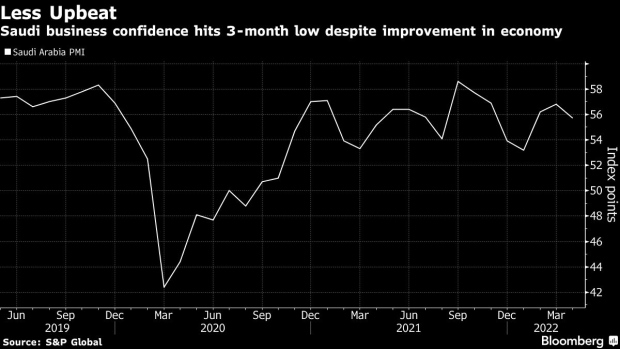May 9, 2022
Saudi Gloom Shows Toll Inflation Is Taking During Economic Boom
, Bloomberg News

(Bloomberg) -- Saudi Arabia is proving vulnerable to fears over inflation in the wake of the war in Ukraine, even at a time when the economy expands at the fastest pace in over a decade.
New order growth in the Saudi non-oil private sector slipped to a three-month low in April as companies sharply raised selling charges to pass on higher input costs, according to a survey of purchasing managers published by S&P Global on Monday.
Confidence among companies worsened, with respondents saying that volatile global prices and greater uncertainty have rattled some clients. Just 9% of respondents provided a positive forecast for their output expectations, compared with an average of 15% for last year.
Business conditions improved overall but still reached the lowest in three months. S&P’s Saudi Purchasing Managers’ Index was at 55.7 last month, still well above the 50-mark separating growth from contraction.
The PMI “showed the first signs of price pressures swaying clients’ spending decisions,” said David Owen, economist at S&P Global. “Business confidence in future activity levels was down to a three-month low and one of the lowest ever recorded, indicating a marked degree of uncertainty over whether the current rate of output growth can be sustained.”
The world’s biggest oil exporter isn’t immune to a recent run-up in global costs even as booming crude prices continue to power its economy. Although domestic consumer inflation only reached an annual 2% in March, it’s less favorable when factoring in the statistical effects of the 2020 value-added tax hike.
Alongside inflation and Russia’s invasion of Ukraine, renewed Covid-19 controls in Asia are also a risk for the Saudi business outlook, according to S&P Global.
Facing higher prices, Saudi companies responded by building up stocks, with purchasing activity and inventories both rising at the sharpest rate since December 2017. The rate of job creation last month was the fastest since June 2021, contributing to increases in wage costs.
“A further marked uptick in output prices during April, in light of rising commodity prices and global inflation fears, risks dampening sales further in the coming months,” Owen said.
©2022 Bloomberg L.P.






